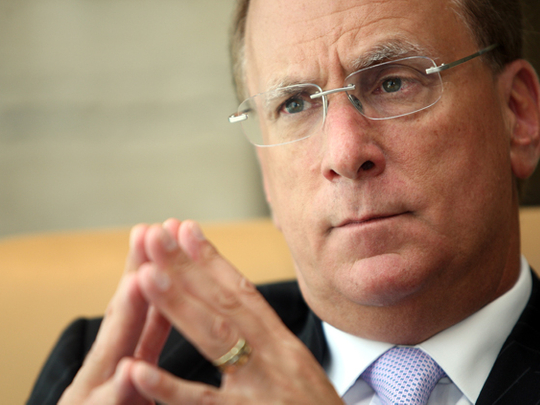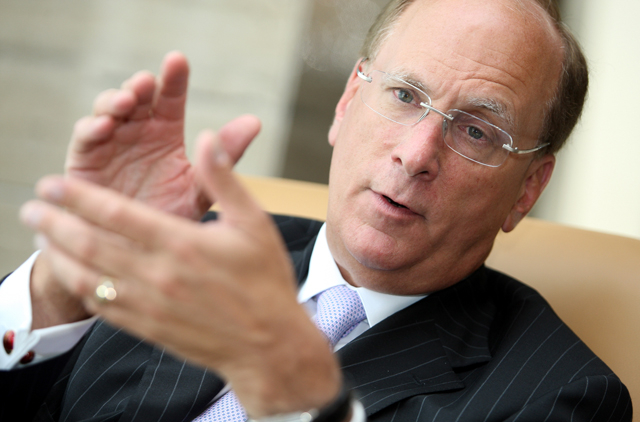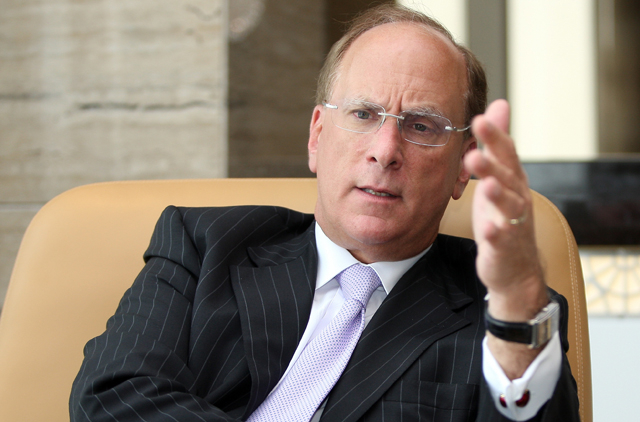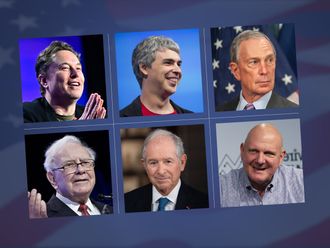
People have to plan on living till they are 92, and if they want a retirement income of $50,000 a year, they will need to save $1.25 million. Most people have not worked this out, and they will live outlive their savings.
These stark facts were the core of Larry Fink's message to individual investors when he spoke to Gulf News in Abu Dhabi.
He pointed out that the average American will face a 35 to 40 per cent gap between what they will have saved for retirement and their real needs. He was clear that there are no safety valves because even with contributions and benefit plans, as well as social security, the government has not put enough into these plans. "The only answer will be asking your children for help," said Fink.
Good news
But Fink was optimistic that good savings plans will be able to cover this gap, pointing out that the expected lengthening of life allows long term investments to work, if people can ignore the short term impact of news and current insecurity.
"Not enough people are focused on the long term. If your needs are in 30 to 40 years' time, why do you care about what is in the newspapers today?" said Fink.
This is why Fink is a firm supporter of investing in equities, which he argues are at a lifetime low, and are also producing dividends which outperform the equivalent income from bonds. The combination of capital growth and dividend income can produce the necessary minimum 7 per cent that can compound annually and build the capital to fund the pension that people will need.
He shared his views on the other challenges facing the global economy.
GLOBAL ECONOMY
United States:
Lack of clear leadership
“There is no certainty. No clarity. No leadership. So as a result we see an anaemic, yet growing US economy,” said Fink. “All the activity that we see is only supporting a 2.5 per cent GDP [expansion] with modest job growth.”
In addition, there is the threat that all of the tax changes which are due at the year end, may really jeopardise the economy. The US government will start a $1.2 trillion (Dh4.4 trillion) deficit reduction programme that will really hit society since it is not based on a long term [plan], but many short term cuts.
As a result, the overall attitude of American executives is one of trepidation and CEOs are not investing aggressively enough for the future, said Fink. “It is very hard for politicians, executives and investors to see beyond the noise made by information that is generally biased towards the negative.
“The underlying problem [of] a lack of clear leadership in the US [can be seen] in the historic low levels of popularity of Congress. The presidential election will make a very serious statement about what direction the country will take.
“The world at large has looked to the US for leadership since the Berlin Wall came down 26 years ago, and in many cases it still leads. We are the global leaders militarily. And we are the leaders in ingenuity. Whether it is Apple or Facebook, no companies are transforming our lives more than companies that are based in the United States.
“And given even this uncertainty in the US, there is even more in the wider world. No one knows who to listen to. China is playing a bigger role and how does that play out?”
Europe:
Needs a dose of moderate inflation
Fink wants to see aggressive monetary easing by the European Central Bank that will lead to moderate inflation in the Eurozone to kick start recovery. In his view, growth in Europe is key to recovery, and the current focus on fiscal discipline actually shrinks the economy, especially in southern Europe.
“Growth in Europe is going to have to come from something other than cuts,” said Fink. “I believe that the European Central Bank has no choice other than to ease and ease aggressively. By doing so, it will bring the euro down to $1.15, and with a $1.15 euro you will see a lot more growth potential in southern Europe.
“The danger with the current programme is that all the responsibility of the restructuring lies with the employees. Cutting wages and reducing spending all leads to social unrest. You cannot do it that way alone, you will need a combination which also includes the reduction of the currency to augment the cuts.
“This may be a controversial view, but it will also be very powerful for Germany. The test will be if Europe can allow moderate inflation if it devalues its currency, which means inflation of 3.5 per cent or less. Anything above that is not acceptable.”
Euro:
Will be a long-term fix
Fink was positive about progress to resolve the euro crisis, but was very clear that he did not see a quick fix working. “It takes time to make these large-scale changes. The European problem is not a one-year fix, it will take six or seven years, maybe even ten years.
“People thought that this could be fixed in two to three years, and that was clearly a mistake. You only have a three-year funding vehicle from the ECB. They have never talked about extending it, but from my perspective they are going to have no choice but to extend it.
“The LTRO [Long Term Refinancing Operations] of the ECB are going to have to be extended, and there are other actions that the ECB will have to take, although they cannot do much unless you see political changes.
“The Europeans have already committed €1 trillion but that is probably not going to be enough. However, you have the IMF raising another $400 billion, and the EFSF is raising more, so there are additional pools of money available for when they are needed.”
China:
Yuan is fairly valued
Fink welcomed the recent revaluation of the Chinese yuan, describing its present value as fair; and he spoke out against the xenophobia in the United States against China, foreseeing a good long-term relationship between the two superpowers.
“China has done a very good job of navigating its currency,” he said. “I think that the yuan is fairly priced today although some in the US may think that it should be more expensive. The yuan has been revalued and the wages have been revalued too. Chinese wages are higher than in other emerging markets but [despite this] there continues to be upward wage pressure in China.”
Fink sees the same global pressure in China as in any other country, emphasising that China cannot continue to rely on cheap labour costs. “China will have to revolutionise its factories to be more efficient.
“China will have the same struggle that Europe has, that the US has. We are all going to have to be efficient, and we cannot just rely on [cheap] wages,” he said.
Looking ahead, “the relationship between the US and China will be fine, even if the US, like a lot of countries, would like to see China become more open. China is a very closed system [which makes it] very hard for businesses to operate there,” Fink said.
“There is also a xenophobia that China has taken jobs away from Americans, but that is generally not so true. Americans would not want those jobs at those wages, and much of this fear is looking for a culprit when your economic future has been dimmed.”
The rise of the Middle class good for global growth
The extraordinary growth of the middle class around the world gives Fink a lot of confidence in continued global growth. "The reality is that the world is a better place to do business today than it was 20 years ago. We all talk about the fringes, but every year as we widen the fringe, it gets easier to do business. There is a freer flow of markets and capital now," he says.
"The growth of the middle class has been faster in numbers than at any time in human history. Countries like China, Brazil, Mexico, India, and Indonesia are all part of a rise of the middle classes by hundreds of millions of people".
Financial regulation must be transparent
Fink is concerned that new regulations for the financial services industry may have summed up society's demands for more prudence, they are short on detail and there is serious lack of clarity on how they will be implemented.
There is also a danger that the new regulations may harm the delicate economic recovery. "I am not trying to suggest that regulations are inappropriate, but we should understand the unintended consequences. Governments do not always conduct cost benefit analyses of their plans, so when Washington creates these laws, it then has to re-interpret them as it realises the cost of its actions," Fink said.
"First, the new regulations come at a time when the economies are pretty weak. The majority of regulations now are designed to create a less risky financial system. By definition less risky means more capital and more capital means [as a percentage of capital] less lending. We need to make sure that as they focus on regulation that it does not disrupt the market and already weak economies," he said.
"Second, the interpretation of the new rules is not clear. Governments and Congress rapidly created all these new rules, but they did not give the rules any certainty. The regulators are now trying to interpret these rules whilst trying to create a regulatory framework for them to function. In some cases, this is a very complex task.
"Third, hopefully these rules will be coordinated across nations so there is no regulatory arbitrage. For example, in continental Europe you see a move to have a transaction tax, but the UK and US have said they will definitely not have one. Those are the regulatory arbitrage problems that we have to sort out, because if you have one set of countries trying to regulate with taxes, it will put continental European countries at a disadvantage against the UK and United States."
Who is too big to fail?
Fink said that regulators are still not clear about who they want to regulate, and there is still no real definition of what kind of institution qualifies as a systemically important financial institution [Sifi]. "Is it one that has leverage? Or is it one that has high interdependency across the economy?" he asked.
"What is very clear, without any misunderstanding, is that society [in the US and EU] has said that we do not want to fund institutions that fail. And if they fail, we do not want to pay their executives obscene sums of money. That much is clear, but how do you now interpret that in [the context of] the new regulations?"
"The institutions that failed in the crisis were mostly banks or security firms. But what will the rules mean for insurance companies, clearing corporations, investment managers? There is no one answer, and I have had conversations with many different regulators and there are many different interpretations," Fink said.
"There is great clarity that we need to raise bank capital standards. Capital standards were too low and we need to raise them, [in order to create] less societal risk.
"Society talked about ‘too big to fail' yet everything I see is to the benefit of the big organisations, not the smaller organisations. Do you really want to reduce the size of these big institutions? We are not seeing any action towards that. The regulations are quite supportive of the larger institutions, and more debilitating towards smaller institutions. There is no consensus."
EQUITIES
Investment strategy
People need to put their money into equities if they are to achieve the necessary savings for a long old age. "You need an investment strategy which compounds annually at more than 7 per cent, and bonds will not do that," said Fink.
"The only way to do that is with a long-term portfolio in equities. These can include some dividend stocks with 4 per cent dividends, which then allow you to only look for 3.5 per cent growth a year.
"If you select a good portfolio of global companies, achieving that growth should not be too hard over a long-term cycle. People like Warren Buffett are growing their investments much faster by picking good companies, focusing on long-term strategies and long-term investments."
Fink explained that "if you keep your nest-egg in bonds you are not going to make enough. You may be frightened of insecurity and world events and go for the safety of cash and bonds, but in this low rate environment, anything that compounds by 2 per cent a year, instead of 5 or 7 per cent, will not save enough."
Dividend returns
"Equities are cheap on a 25-year historic average," said Fink. "PE ratios [price/earnings ratio] are very low, and are back to where they were in the early 1980s.
"In addition, the dividend returns from equities, versus the interest from bonds, are at a lifetime wide spread. Never could you earn this much in dividends compared to bond yields.
"Stocks are so cheap because systemically everyone is so frightened. Everyone is pulling away from the most volatile asset class [equities] into the least volatile class [cash]. But no one points out that earning zero from cash is just as bad as volatility in equities. If you have been in cash for five years you can see how debilitating that is".
Prepare for a long old age
Most people will outlive their savings. They will live until they are 90.
"If you are a 60-year-old couple, and in good health, the likelihood is that one of you will live until you are 92," said Fink. And he posed a frightening question aimed at millions of ill-prepared people around the world: "If you are 35 years old, you have 30 more years of work, and then another 27 more years of retirement. Will you have enough savings?"
The problem was summed by Fink assuming that most people will live until they are 90, that means preparing for 25 years of retirement. "Let's say that you will need $50,000 after tax — if you work backwards that means you will need $1.25 million to have the capital producing the money that you will need to live on, after tax and allowing for inflation." There are no safety valves, said Fink. "If you have not saved enough, the only answer will be asking your children for help.
"Even if we have contributions and benefit plans, as well as social security, the governments have not put enough into these plans."
But there is an advantage to the expected lengthening of life, since it allows long-term investments to work, if people can ignore the short term impact of news and current insecurity.
"Not enough people are focused on the long term. If your needs are in 30 to 40 years' time, why do you care about what is in the newspapers today?
"When your liability is 35 years away, it is not correct to think your money is safer in cash," he said. "Of course, if you are 65 years old and your horizon is short, you should be heavily in bonds and partially in stocks.
"If your horizon is only five years, then you do need to worry about today because your entry level is so important."
THE GULF
Needs strong private sector
"A major issue in the Gulf is the inability to aggressively build a private sector. The economies are still heavily dominated by the public sector, and you see this in every country in the region.
"To accelerate real growth in the region there needs to be a more balanced economy. The Gulf is being held back because there has not been a forceful enough transition from the public to private sector."
Investors more sophisticated
"The sophistication of investors in the Gulf region has grown dramatically over the last seven years. The understanding of risk and the need for risk management has improved. The use of alpha and beta products has been very high, as has the use of hedge funds.
"Some are less worried about annual volatility and they have more equities. Others will have more bonds and indexing. They have navigated risk with very different strategies across the Gulf region, there is no one common theme."
In reply to a direct question about individual sovereign funds, Fink gave the perfectly correct answer: "I do not talk about any clients. My relationship with my clients is confidential."
Influence has grown
"The Gulf's voice has grown over the last ten years and has a huge influence on events through its investments. Consequently, as the pool of wealth grows in the region, so does its influence on capital markets.
"They have a financial voice in the world. Do not think it goes unnoticed by secretaries of treasury and finance ministers around the world if there are large movements of assets by investors here in the Gulf."













